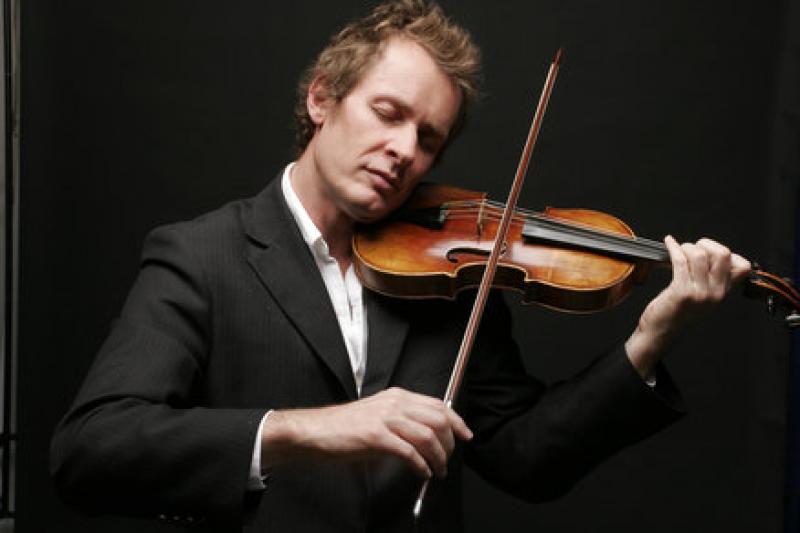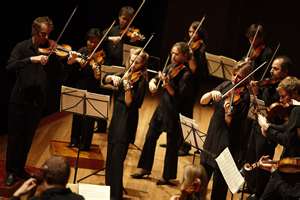Upshaw, Australian Chamber Orchestra, Tognetti, Cadogan Hall | reviews, news & interviews
Upshaw, Australian Chamber Orchestra, Tognetti, Cadogan Hall
Upshaw, Australian Chamber Orchestra, Tognetti, Cadogan Hall
A transfigured night indeed from Australia's finest export

“Well that was bloody fantastic,” a broad Aussie accent declared from somewhere behind me at the end of Ravel’s String Quartet in F major. And that’s the thing with the Australian Chamber Orchestra – it’s just that simple.
A carefully curated programme took us from worldly caprice (in every sense) in Tognetti’s Paganini homage to existential bliss of Schoenberg’s Verklärte Nacht – an act of transfiguration that echoed the musical processes of this last. Not content to accept Schoenberg’s as the only word on darkness and night-time, the ACO were joined by Dawn Upshaw for Schumann’s “Mondnacht”, Schubert’s Der Tod und das Madchen, as well as the bitter passion of Schoenberg’s own “Litanei”.
Virtuosity and simplicity both find themselves amplified by Tognetti’s sonic games
Upshaw’s technique serves her well in contemporary repertoire, and she flayed emotion raw with her Schoenberg – at once controlled and desperate (Upshaw pictured below). Yet the simplicity of “Mondnacht” (an unforgiving opener if ever there was one) almost undid her, exposing rare weakness in a lack of sustained legato and purity of tone.
Legato wasn’t a problem for Tognetti, who sang rather than played his way through Richard Meale’s Cantilena Pacifica. It’s a work that does what it says on the tin, sustaining a heady cantilena over a barely-accompaniment from rocking strings. It’s an attractive piece, the solo line occasionally losing its way harmonically before remembering itself and returning to join the rest of the strings, and sits just the right side of glib.
 A new work, Tognettti’s Caprice on Paganini Caprices (DEVA) deserves to find a place in the chamber repertoire. Poetic and just a little witty, it reimagines Caprices No 17 and 20, preserving the composer’s original gestures but not always his music. Virtuosity and simplicity (the opening of No 20) both find themselves amplified by Tognetti’s sonic games, with melody passed among three soloists, while the remaining musicians drift in and around in a storm-cloud of textural energy.
A new work, Tognettti’s Caprice on Paganini Caprices (DEVA) deserves to find a place in the chamber repertoire. Poetic and just a little witty, it reimagines Caprices No 17 and 20, preserving the composer’s original gestures but not always his music. Virtuosity and simplicity (the opening of No 20) both find themselves amplified by Tognetti’s sonic games, with melody passed among three soloists, while the remaining musicians drift in and around in a storm-cloud of textural energy.
 Although sensitive accompanists, it was lovely to see the ACO collectively step forward for Ravel’s String Quartet in F major (arranged for string orchestra) and Verklärte Nacht. Like the King’s Singers the ACO have an ensemble energy that only comes from hours spent playing in one another’s company. Here it emerged in the risks – the dense, weighty pizzicato like heavy rainfall in Ravel’s Assez vif, the conversation ebb and chatter of the Vif et agite.
Although sensitive accompanists, it was lovely to see the ACO collectively step forward for Ravel’s String Quartet in F major (arranged for string orchestra) and Verklärte Nacht. Like the King’s Singers the ACO have an ensemble energy that only comes from hours spent playing in one another’s company. Here it emerged in the risks – the dense, weighty pizzicato like heavy rainfall in Ravel’s Assez vif, the conversation ebb and chatter of the Vif et agite.
Tognetti’s arrangement brings out the orchestral scope Ravel condenses into this work, building on it rather than diluting it with his larger forces. Yes, there are moments where the purity of a single instrumental voice might serve the music better, and the unison melodies hide no lapses of intonation or phrasing within a section, but the ACO handle this well.
The beauty of Verklärte Nacht is all in the emotional pacing. It would be possible to play it with complete commitment and intensity throughout, and in so doing to drain it of any impact. The skill lies in calibrating the arcs of tension and release that peak and lapse through this half-hour epic. Tognetti and his band are never less than absolutely in control – so much so that they can deploy abandon as a musical colour without it becoming cloying or mawkish. Led by the cellos, the ensemble set aside the brittle French edge of earlier and bedded down deep into Schoenberg’s thick textures. And with this the ACO sent us home from the concert hall reeling as much as any of the tipsy Saturday night revellers in Sloane Square, but for infinitely better reasons.
Explore topics
Share this article
The future of Arts Journalism
You can stop theartsdesk.com closing!
We urgently need financing to survive. Our fundraising drive has thus far raised £49,000 but we need to reach £100,000 or we will be forced to close. Please contribute here: https://gofund.me/c3f6033d
And if you can forward this information to anyone who might assist, we’d be grateful.

Subscribe to theartsdesk.com
Thank you for continuing to read our work on theartsdesk.com. For unlimited access to every article in its entirety, including our archive of more than 15,000 pieces, we're asking for £5 per month or £40 per year. We feel it's a very good deal, and hope you do too.
To take a subscription now simply click here.
And if you're looking for that extra gift for a friend or family member, why not treat them to a theartsdesk.com gift subscription?
more Classical music
 Solomon, OAE, Butt, QEH review - daft Biblical whitewashing with great choruses
Even a top soprano and mezzo can’t make this Handel paean wholly convincing
Solomon, OAE, Butt, QEH review - daft Biblical whitewashing with great choruses
Even a top soprano and mezzo can’t make this Handel paean wholly convincing
 Two-Piano Gala, Kings Place review - shining constellations
London Piano Festival curators and illustrious friends entertain and enlighten
Two-Piano Gala, Kings Place review - shining constellations
London Piano Festival curators and illustrious friends entertain and enlighten
 Echo Vocal Ensemble, Latto, Union Chapel review - eclectic choral programme garlanded with dance
Beautiful singing at the heart of an imaginative and stylistically varied concert
Echo Vocal Ensemble, Latto, Union Chapel review - eclectic choral programme garlanded with dance
Beautiful singing at the heart of an imaginative and stylistically varied concert
 Scott, Irish Baroque Orchestra, Whelan, RIAM, Dublin review - towards a Mozart masterpiece
Characteristic joy and enlightenment from this team, but a valveless horn brings problems
Scott, Irish Baroque Orchestra, Whelan, RIAM, Dublin review - towards a Mozart masterpiece
Characteristic joy and enlightenment from this team, but a valveless horn brings problems
 Classical CDs: Voice flutes, flugelhorns and froth
Baroque sonatas, English orchestral music and an emotionally-charged vocal recital
Classical CDs: Voice flutes, flugelhorns and froth
Baroque sonatas, English orchestral music and an emotionally-charged vocal recital
 Kanneh-Mason, Britten Sinfonia, Shave, Milton Court - a grin and a big beaming smile
A pair of striking contemporary pieces alongside two old favourites
Kanneh-Mason, Britten Sinfonia, Shave, Milton Court - a grin and a big beaming smile
A pair of striking contemporary pieces alongside two old favourites
 theartsdesk at the New Ross Piano Festival - Finghin Collins’ musical rainbow
From revelatory Bach played with astounding maturity by a 22 year old to four-hand jazz
theartsdesk at the New Ross Piano Festival - Finghin Collins’ musical rainbow
From revelatory Bach played with astounding maturity by a 22 year old to four-hand jazz
 First Person: Manchester Camerata's Head of Artistic Planning Clara Marshall Cawley on questioning the status quo
Five days of free events with all sorts of audiences around Manchester starts tomorrow
First Person: Manchester Camerata's Head of Artistic Planning Clara Marshall Cawley on questioning the status quo
Five days of free events with all sorts of audiences around Manchester starts tomorrow
 Goldscheider, Brother Tree Sound, Kings Place review - music of hope from a young composer
Unusual combination of horn, strings and electronics makes for some intriguing listening
Goldscheider, Brother Tree Sound, Kings Place review - music of hope from a young composer
Unusual combination of horn, strings and electronics makes for some intriguing listening
 theartsdesk Q&A: composer Donghoon Shin on his new concerto for pianist Seong-Jin Cho
Classical music makes its debut at London's K-Music Festival
theartsdesk Q&A: composer Donghoon Shin on his new concerto for pianist Seong-Jin Cho
Classical music makes its debut at London's K-Music Festival

Add comment